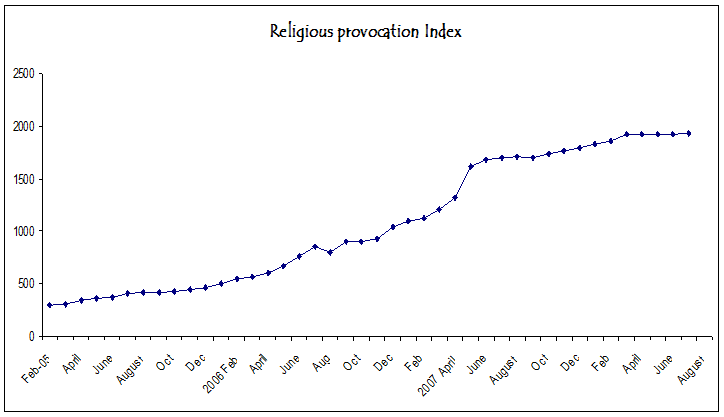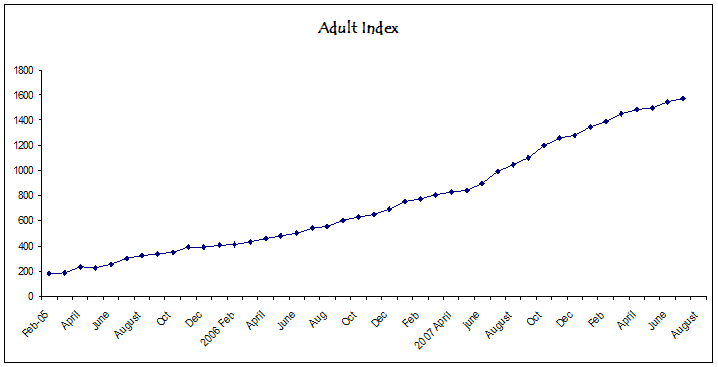Spike in Immoral Behavior and Religious Intolerance
Updated Feb 2024
There is evidence to suggest that certain behaviours and attitudes related to sexuality and morality have shifted in recent decades. However, perceptions of morality are complex and evolving.
Surveys indicate an increase in acceptance and engagement in casual sexual encounters. For example, a 2020 study found the percentage of Americans who say premarital sex is “not wrong at all” rose from 29% in 1972 to 68% in 2018. Another study found the median number of lifetime sexual partners increased significantly since the 1960s. This suggests a more significant normalization of casual sex.
Increase in Online Pornography
Pornography access and consumption have surged with the internet. Pornhub, one of the world’s largest porn sites, reported 42 billion visits in 2019, up from 2.5 billion a decade prior. While pornography itself is legal, some argue its prevalence promotes the commodification of sex.
Economic Factors Driving Sex Work
Limited data exists, but research suggests economic vulnerability is a driver for entering sex work, including illegal prostitution. A 2014 study of sex workers found two-thirds cited financial reasons as their motivation. However, the degree of choice vs. coercion was unclear.
Declining Religiosity
Religiosity and religious-based moral frameworks are declining in the U.S. The percentage of adults who describe themselves as Christian dropped from 78% to 65% from 2007 to 2019. This erosion of traditional value systems may have influenced sexual attitudes.
Views differ on whether these trends represent moral decay or increasing social tolerance. Some see the liberalization of sexual norms as undermining traditional values, while others view it as aligned with principles of personal autonomy and freedom. The complexity lies in who defines morality and by what standards.
While indicators of shifting sexual ethics exist, perceptions are coloured by one’s social, cultural, and philosophical lens. Blanket statements about moral decline fail to capture the nuances involved.
The Adultification and Objectification of Women
The rise of the so-called “brothel bus” in Miami Beach offers a troubling case study into the adultification and commodification of women’s bodies. While the operators of this mobile strip club have been brought to justice, the existence of such services speaks to more significant societal issues regarding the perception of women as sexual objects.
Objectification reduces women to their physical attributes and sexuality, viewing them as commodities rather than complete human beings. The adult entertainment industry has long relied on this reductionist impulse, as evidenced by the use of terms like “G-strings filled with cash.” Here, a woman’s sexuality becomes a monetary transaction devoid of intimacy or meaning.
Disturbingly, the past decade has seen a sharp increase in adultification and sexualization of women at increasingly younger ages. Studies demonstrate that girls as young as elementary school age have issues with body image and self-esteem as a result of excessive exposure to sexualized depictions in media and advertising. The American Psychological Association directly correlates this trend with increased rates of depression, eating disorders, and risky sexual behaviour in adolescent girls.
The “brothel bus” fiasco demonstrates that women’s bodies continue to be objectified and commodified to satisfy male desires and to generate profits. It is merely an extreme example of broader societal attitudes that fail to recognize the full dignity and humanity of women. Reversing the trend of objectification requires education, media reform, and a culture-wide re-examination of how women are depicted and treated.
The Evolution of Intimacy: Internet Porn, Sugar Dating, and Dating App Trends
The rise of internet pornography has had a profound impact on sexual attitudes and behaviours. In 2019, the popular porn site Pornhub reported over 42 billion visits, with the U.S. being the highest traffic country]]. This widespread consumption of pornography has been linked to increasingly permissive attitudes towards casual sex, particularly among younger generations.
A 2020 study found that 68% of Americans now say premarital sex is “not wrong at all,” up from just 29% in 1972]]. The same study noted that the median number of lifetime sexual partners has increased significantly over the past few decades. These shifting norms around sex and relationships suggest a move away from traditional notions of sexual morality.
The Commodification of Sex and the Rise of “Sugar Dating”
The commodification of sex and intimacy has taken on new forms in the digital age. One troubling example is the rise of so-called “sugar dating” websites, which connect wealthy older men with younger women for transactional relationships. SeekingArrangement, the largest of these sites, saw a 74% increase in sign-ups in 2021, with many women citing economic hardship due to the COVID-19 pandemic as their reason for joining]].
While some argue that these arrangements are consensual, critics point out the inherent power imbalances and potential for exploitation. The normalization of trading sex and companionship for financial gain points to a troubling commodification of intimacy.
Hookup Culture and Dating App Fatigue
The proliferation of dating apps like Tinder and Bumble has made casual sexual encounters more accessible than ever. A 2019 study found that 30% of U.S. adults have used a dating site or app, with 12% finding a long-term relationship or marriage through these platforms]].
However, many users feel burnt out by the endless swiping and superficial interactions. The term “hookup culture” has been used to describe the emotionally detached, commitment-averse nature of these encounters. Some argue that this commodified approach to sex and relationships is contributing to declining mental health and a general sense of disconnection]].
Index Slows, Unleashing Global Surge in Immorality and Hardships
For the 1st time in months, this index has decided to slow down the pace at which it advances. However, it has not pulled back yet, but it has only gained 12 points in the last three months. It is still at a very high level, and as such, this means that planned and random acts of terror, violence, and war will be on the rise. It also now means that we will start to witness increased hardships caused indirectly by the effects of war or repression; the situation in Zimbabwe and parts of North Africa are excellent illustrations of this point. Expect immoral behaviour to rise to levels never seen before over the next five years.

Immoral Behavior and the Adult Index
The Adult index continues to roar to new highs in the last three months. It tacked on 125 points from 1450 to 1575. As we stated many times before, these new highs indicate that society is moving into a zone that we have decided to label as the “I am willing to do whatever it takes for money or material gains zone’. One can see this with the increase in reality-type shows where the individuals are willing to do whatever it takes to get a shot at fame, even indirectly selling themselves in shows such as The Bachelor or The Bachelorette. The story below quite clearly explains this new trend.
Miami Beach police have reported that a notorious “brothel bus,” known for offering lap dances and drinks while cruising the streets, has been permanently taken out of operation. According to authorities, the bus, resembling a sleek black limousine, was impounded, and its operator was arrested in the early hours of Sunday. For a fee of $40, passengers were granted access to unlimited drinks and a tour of the popular South Beach neighbourhood, frequented by tourists and club enthusiasts. Undercover detectives, who boarded the bus, discovered a fully stocked bar and several young women who undressed to reveal G-strings filled with cash. These individuals reportedly offered sexual services, including oral sex, for $100. Full Story
Exposed: Inside the Scandalous “Brothel Bus” of South Beach
The stylish black bus roamed the vibrant South Beach neighbourhood, a hub for tourists and club enthusiasts, enticing passengers with rides and an enticing offer of unlimited drinks at a mere $40. However, an undercover operation revealed a shocking scene on board. Detectives discovered a fully stocked bar and encountered several young women who proceeded to remove their clothing, revealing G-strings filled with cash.
These women brazenly offered sexual services to passengers. The complete story provides further instances illustrating this shift in mindset. One particular article titled “Entire Life Sold for £192,000” and another detailing a single mother selling her home and emotions online exemplify this noteworthy transformation.
The Psychology of Immoral Behavior
In the past few decades, psychologists have extensively studied various ways in which our minds often fail to perceive what is right in front of us. They have coined the term “bounded ethicality” to describe the idea that our cognitive abilities to act ethically are significantly limited because we sometimes overlook the broader ethical perspective.
To illustrate this, consider how the framing of a decision can greatly influence our perception. According to Tenbrunsel, how a decision is presented profoundly affects our view of that decision and ultimately influences our choice.
In essence, Tenbrunsel asserts that specific cognitive frameworks can render us oblivious to the fact that we are facing an ethical dilemma.
Tenbrunsel shared an experiment that effectively highlights this issue. She divided participants into two groups, instructing one group to contemplate a business decision and the other to consider an ethical decision. Those pondering the business decision formulated one mental checklist, while those contemplating an ethical decision developed a different one.
Next, Tenbrunsel diverted the participants’ attention by engaging them in an unrelated task. Afterwards, she presented them with an opportunity to cheat. Full Story
Unethical Behavior Is it the Same as Immoral Behavior?
“Over the years, various instances of unethical behaviour in corporations have been observed, including manipulative accounting practices and operational misconduct. These behaviours often stem from management’s desire to meet Wall Street’s expectations. What initially appears as a seemingly harmless manipulation to avoid disappointing investors—such as engaging in excessive trading at quarter-end, ignoring escalating insurance losses, or depleting a reserve fund—can eventually escalate into full-blown fraudulent activities.”
Buffett’s message is significant because it relates to most individuals: well-intentioned leaders who sometimes overlook their moral compass as they navigate a landscape filled with potential hazards and pitfalls. For this majority, moral leadership is not merely acting in good or bad faith. It involves skillfully manoeuvring through the vast grey area that exists in between.
So, how can you recognize when you or your team is heading towards an ethical lapse? Here, we delve deeper into identifying signs of arrogance, desensitization to cultural norms, and willful neglect within yourself and your team, along with some suggestions for combating these dynamics. Full Story
The Dark Side of Going Abroad
Due to the unprecedented pace of globalization, foreign experiences have become increasingly common and valued. Previous research has primarily focused on the positive outcomes of foreign experiences, such as enhanced creativity and reduced biases towards different social groups. However, the present study sheds light on a potentially harmful aspect of foreign experiences: increased immoral behaviour.
We suggest that extensive foreign experiences involving exposure to multiple foreign countries promote cognitive flexibility and moral flexibility. Eight studies were conducted using longitudinal, correlational, and experimental methods involving over 2,200 participants. The results consistently demonstrate that broad foreign experiences can lead to immoral behaviour by fostering moral relativism, which is the belief that morality is relative rather than absolute.
The relationship between broad foreign experiences and immoral behavior was found to be robust across diverse cultural populations (including anglophone and francophone), various life stages (such as high school students, university students, MBA students, and middle-aged adults), and through the use of seven different measures of immorality. As individuals become exposed to various cultures, their moral compass may lose some of its precision. NCBI
Conclusion
While attitudes around sex and morality are complex and ever-evolving, there are concerning trends that point to a rise in commodified, transactional approaches to intimacy. The ubiquity of internet pornography, the growth of sugar dating, and the normalization of casual hookups via dating apps all suggest a shift away from sex as part of committed, emotionally invested relationships.
However, it’s important to note that these trends do not represent the attitudes and behaviours of all individuals. Many still prioritize love, commitment, and emotional connection in their sexual relationships. As a society, we must continue to have nuanced conversations about sexual ethics and the impacts of commodification on our collective well-being.
Articles That Nourish the Intellect and the Soul
BIIB stock Price: Is it time to buy












